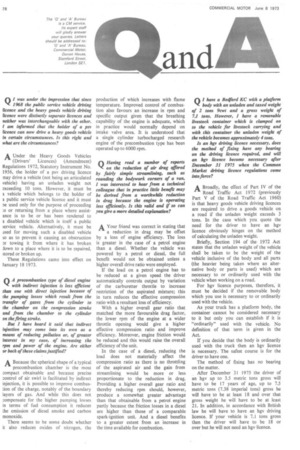Q Having read a number of reports on the reduction of
Page 80

If you've noticed an error in this article please click here to report it so we can fix it.
air drag offered by fairly simple streamlining, such as rounding the bodywork corners of a van, I was interested to hear from a technical colleague that in practice little benefit may be derived from a worthwhile reduction in drag because the engine is operating less efficiently. Is this valid and if so can you give a more detailed explanation?
A Your friend was correct in stating that
a reduction in drag may be offset by a loss of engine efficiency. The loss is greater in the case of a petrol engine than a diesel. Whether the vehicle was powered by a petrol or diesel, the full benefit would not be obtained unless a higher overall drive ratio were employed.
If the load on a petrol engine has to be reduced at a given speed the driver automatically controls output by variation of the carburetter throttle to increase restriction of the aspirated mixture; this in turn reduces the effective compression ratio with a resultant loss of efficiency.
With a higher overall gear ratio that matched the more favourable drag factor, the lower rpm of the engine at a wider throttle opening would give a higher effective compression ratio and improve efficiency. Moreover, engine friction would be reduced and this would raise the overall efficiency of the unit.
In the case of a diesel, reducing the load does not materially affect the compression ratio as there is no throttling of the aspirated air and the gain from streamlining would be more or less proportionate to the reduction in drag. Providing a higher overall gear ratio and thereby reducing rpm should, however, produce a somewhat greater advantage than that obtainable from a petrol engine partly because the friction losses in a diesel are higher than those of a comparable spark-ignition unit. And a diesel benefits to a greater extent from an increase in the time available for combustion.












































































































































